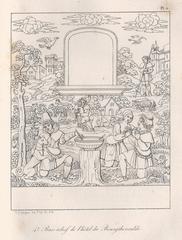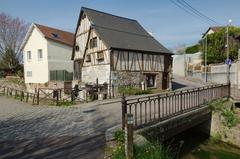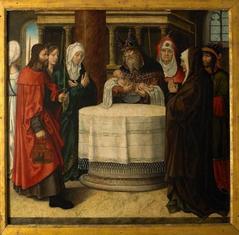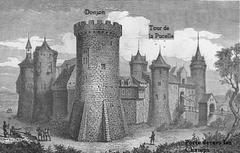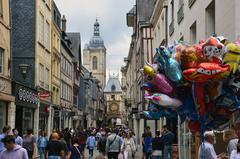Place du Docteur-Alfred-Cerné: Visiting Hours, Tickets, and Historical Sites in Rouen
Date: 04/07/2025
Introduction
Nestled within the heart of Rouen, Normandy’s historic capital, Place du Docteur-Alfred-Cerné stands as a peaceful and culturally resonant square. Named after Dr. Alfred Cerné, a revered local physician and humanitarian, the square is both a tribute to Rouen’s medical heritage and an inviting urban retreat. Its location within Rouen’s secteur sauvegardé (protected historic center) makes it a gateway to the city’s rich tapestry of medieval architecture, art, and community life. This guide explores its history, significance, practical visitor information, nearby attractions, and tips for making the most of your visit (Offbeat France; Normandie Tourisme; France This Way).
Historical Background and Significance
Place du Docteur-Alfred-Cerné honors Dr. Alfred Cerné (1863–1945), whose career as a physician was marked by dedication to public health, particularly during the Spanish flu pandemic and both World Wars. Dr. Cerné’s advocacy for modern medical facilities and equitable healthcare left a lasting imprint on Rouen’s civic identity. The square’s proximity to the historic Hôtel-Dieu hospital—Rouen’s medieval center of healing—signals its deep roots in the city’s medical and humanitarian history (Offbeat France).
The area around the square encapsulates centuries of architectural evolution, from medieval timber-framed houses to 19th-century stone facades, reflecting Rouen’s transformation from a medieval metropolis to a vibrant modern city.
Urban and Cultural Context
Place du Docteur-Alfred-Cerné serves as a serene urban space amid the bustling city. Unlike the more crowded Place du Vieux-Marché or Place de la Cathédrale, it offers a tranquil spot for rest and reflection. The square is lined with benches and shaded by trees, providing a welcoming environment for locals and visitors alike.
Regularly hosting small markets, community gatherings, and local events, the square is a living part of Rouen’s social fabric. Its dedication to a humanitarian figure highlights the city’s appreciation for contributions to public welfare beyond political or artistic spheres.
Architectural Features and Surroundings
While the square itself is modest, its surroundings offer remarkable historical and architectural interest:
- Hôtel-Dieu Hospital Complex: A historic hospital with roots in the Middle Ages, now housing a medical history museum. Notably connected to Gustave Flaubert, whose father was chief surgeon here (Offbeat France).
- Nearby Landmarks: The square is a short walk from the Church of Saint-Maclou, Aître Saint-Maclou ossuary, and Musée Le Secq des Tournelles (wrought ironwork museum), making it a strategic starting point for exploring Rouen’s heritage (Offbeat France).
Visiting Information
Hours and Tickets
- Place du Docteur-Alfred-Cerné: Open to the public 24/7, year-round. No entrance fee.
- Nearby museums:
- Hôtel-Dieu Medical History Museum: Tuesday to Sunday, 10:00 AM to 6:00 PM; admission around €5 (discounts available).
- Musée Le Secq des Tournelles: Open daily except Mondays, 10:00 AM to 6:00 PM; admission around €7.
- Guided Tours: Bookable via the Rouen tourism office, often including detailed historical context and Dr. Cerné’s legacy (Offbeat France).
Accessibility
- General: The square is paved and level, with curb cuts and seating. It is wheelchair and stroller-friendly.
- Public Transport: “Théâtre des Arts” tram stop is a 7-minute walk away. Buses and accessible transit options are available (Becoming Carmen).
- Parking: Accessible parking at Parking Cathédrale and Parking Vieux Marché (Visiterouen.com).
- Visitor Facilities: Information in Braille, large print, and FALC at the tourist office. Audio guides, magnetic induction loops, and tactile maps are available.
- Cycling: Bike racks and Seine à Vélo route nearby (Normandie Tourisme).
When to Visit
The square is most enjoyable in spring and summer, especially early mornings or late afternoons. Check the city’s event calendar for festivals and markets (France This Way).
Amenities
A variety of cafés, bakeries, shops, and accessible restrooms surround the square, reflecting Rouen’s status as a UNESCO City of Gastronomy.
Commemorative Elements
Plaques and memorials throughout the square honor Dr. Cerné and his contributions, fostering reflection on the city’s social history. These commemorative elements are often integrated into local educational programs.
Notable Nearby Attractions
- Cathédrale Notre-Dame de Rouen: France’s tallest cathedral, famed for its Gothic facade and Monet’s paintings (Normandie Tourisme).
- Le Gros Horloge: A 14th-century astronomical clock in a Renaissance archway, offering panoramic city views (Intrepid Scout).
- Musée des Beaux-Arts: Renowned for its Impressionist collection and masterpieces by Monet, Géricault, and others (France This Way).
- Rouen Ceramic Museum: Showcasing Normandy’s faience tradition in a 17th-century mansion (Travelfrancebucketlist).
- Musée Le Secq des Tournelles: Unique wrought ironwork museum in a former Gothic church (Travelfrancebucketlist).
- Place du Vieux-Marché & Church of Saint Joan of Arc: Historic square, site of Joan of Arc’s execution, surrounded by lively markets and cafés (Intrepid Scout).
- Saint-Ouen Abbey Church: Gothic abbey with renowned Cavaillé-Coll organ (Intrepid Scout).
- Rue Eau de Robec & Rue Martainville: Picturesque medieval streets with cafés and preserved architecture (Intrepid Scout).
- Local Markets: Held several days a week, featuring Normandy’s culinary specialties (France This Way).
Practical Visitor Tips
- Visit early or late in the day for tranquility.
- Use navigation apps or the Rouen Tourist Office for accessible routes.
- Emergency services: Dial 112.
- Dress for the season; Rouen is known for occasional rain.
- Download the Audiala app for guided tours and up-to-date information.
Visuals and Media
For interactive maps, virtual tours, and photographs of the square and surrounding landmarks, visit the official Rouen tourism website. Images typically capture the square’s tree-lined serenity, commemorative plaques, and adjacent historic architecture.
Frequently Asked Questions (FAQ)
Q: Is there an entrance fee or ticket required to visit Place du Docteur-Alfred-Cerné?
A: No, the square is a public space open 24/7 with free access.
Q: Are there accessible routes and facilities for visitors with disabilities?
A: Yes, the square is wheelchair-friendly, with accessible parking, curb cuts, and facilities nearby (Visiterouen.com).
Q: How do I get to Place du Docteur-Alfred-Cerné?
A: The square is easily reached by tram (Théâtre des Arts stop), bus, or a short walk from the train station. Parking is available nearby.
Q: What notable attractions are nearby?
A: See the list above, including Rouen Cathedral, Le Gros Horloge, Musée des Beaux-Arts, and Place du Vieux-Marché.
Q: Can I join a guided tour?
A: Yes, guided tours are available through the Rouen tourism office.
Conclusion and Call to Action
Place du Docteur-Alfred-Cerné is not only a tranquil retreat in Rouen’s bustling center but also a living testament to the city’s enduring values of community, history, and inclusivity. Its accessibility, cultural vibrancy, and proximity to world-class attractions make it a must-see for every visitor.
For more detailed itineraries, accessibility information, and updates on local events, download the Audiala app. Start your exploration of Rouen’s historic core from this evocative square, and let its legacy inspire your journey through Normandy’s past and present.
References and Further Reading
- Things to do in Rouen, Offbeat France (offbeatfrance.com)
- Things to See and Do in Rouen, Normandie Tourisme (normandie-tourisme.fr)
- Things to Do in Rouen, Travel France Blog (travelfranceblog.com)
- Places to Visit in Rouen, France This Way (francethisway.com)
- Accessibility Information, Visiterouen.com (visiterouen.com)
- Tips for First Visit to Rouen, Intrepid Scout (intrepidscout.com)
- Rouen Tourism Official Website (en.visiterouen.com/inspirations/visit-in-2-days/)
